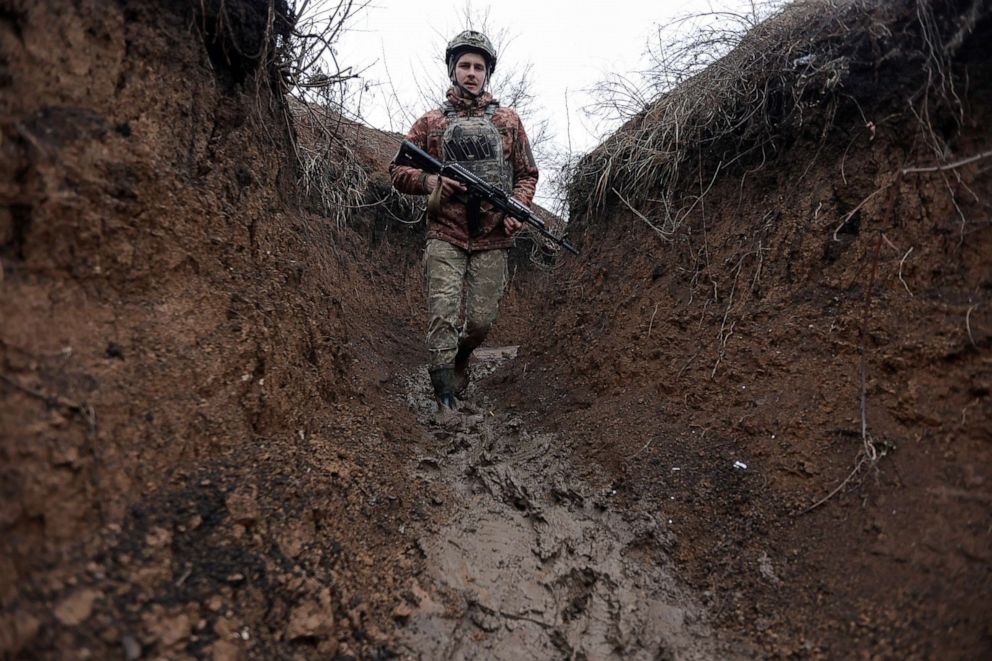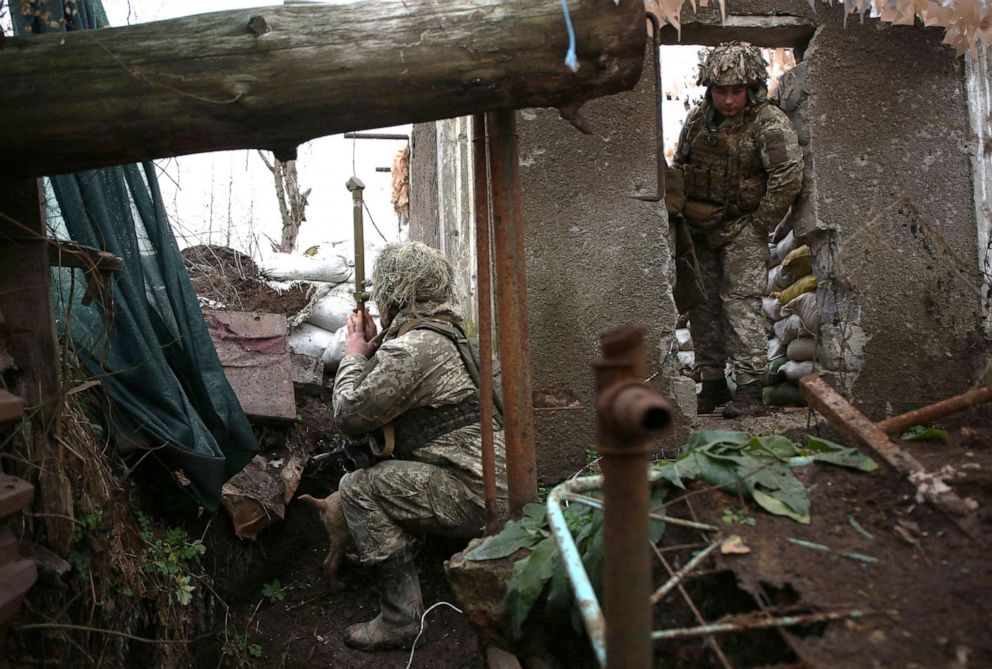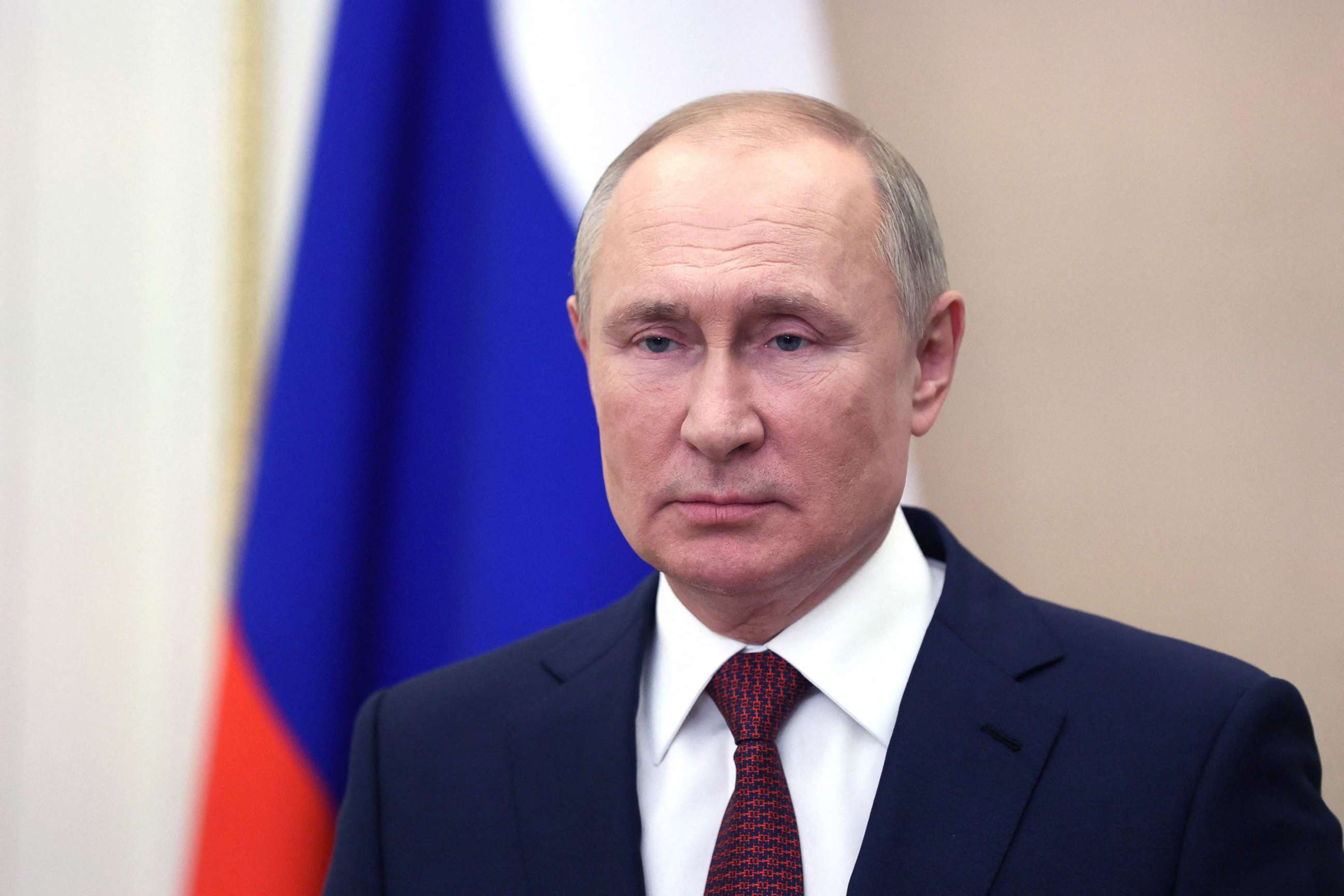On the front line of eastern Ukraine, as Biden and Putin talk
Amid fears of a new Russian invasion, war in Ukraine's east grinds on.
AVDIIVKA, Ukraine -- As President Joe Biden called Russian President Vladimir Putin this week, warning him against launching a renewed invasion of Ukraine, Ukrainian soldiers were going through an ordinary day on the front in eastern Ukraine.
Hunkered down in their positions in shell-shattered factories and muddy trenches, they kept watch while every hour or so the sound of small-arms fire popped from the lines of Russian-backed separatists a few dozen yards away.
The main purpose of the call for Biden was to try to deter Putin from launching a new incursion, amid fears over the buildup of tens of thousands of Russian troops on Ukraine's eastern border.
But in positions on the edge of Avdiivka, an industrial town in Ukraine's Donbas region where Ukrainian troops have been dug in opposite the Russian-backed separatist lines for seven years, the call seemed to attract only mild attention. Although they acknowledged uncertainty about it, there was little sense the Ukrainian soldiers were bracing for an imminent invasion.
Instead, the troops there were focused on the daily dangers of the conflict that has not died despite a 2015 peace agreement, remaining for years -- a slow, bleeding wound on Ukraine's eastern edge.
Several soldiers told ABC News reporters this week that they don't see a renewed massive Russian offensive as likely for now, though they said they needed to be ready all the same.

Oleksiy Kasyanov, a 22-year-old lieutenant from the 25th Airborne Brigade, said he was aware of the Russian build-up but said he thinks it's mostly posturing.
"I think it's a show," he said, standing in a trench where his unit is deployed for the next six months.
More senior Ukrainian military officials have expressed greater concerns. The head of Ukraine's military intelligence service has warned Russia may be preparing to invade in late January. U.S. intelligence has expressed similar concerns, briefing U.S. newspapers last week that the Kremlin may be planning a multi-front offensive then involving up to 175,000 troops.
U.S. officials have said they do not think Putin has yet decided to use force or if the build-up is just a ploy to intimidate. But they fear the possibility of invasion is now higher than any time since 2015.
The conflict in eastern Ukraine began shortly after Russia annexed Crimea in 2014 and then armed and directed separatist paramilitaries who seized control in the Donetsk and Luhansk regions. Russian regular units later intervened on a large scale as the paramilitaries suffered setbacks. A peace agreement in 2015 ended large-scale fighting but never resolved the conflict. Instead, it settled into the smoldering stand-off, where the Ukrainians and Russian-backed forces eye each other from trenches and exchange sporadic fire along the line most days. The war has displaced over two million people and killed over 10,000 since 2014.
Fifty-five Ukrainian soldiers have died this year already, with many more injured, according to Ukraine's defense ministry. Separatist authorities announced an end to a ceasefire earlier this year, and casualties have since ticked up, according to a UN human rights monitoring mission to the region. It found between February and July, 15 civilians were killed and 47 injured, a 50% increase from last year.
Western countries worry that Russia is now ready to break up the current deadlock with a major incursion if it fails to get concessions from the U.S. and Ukraine over NATO support for the country and to implement more of the 2015 peace agreement.

Putin has denied Russia is preparing any type of invasion, accusing Western countries and Ukraine of provoking tensions.
On the ground, Ukrainian officers said the situation along the front felt as usual for now.
Brigadier General Anatoly Shevchenko, deputy commander for Ukraine's Joint Forces, said that military activity along the frontline had increased slightly but "not a lot."
He said, for now, Ukraine had not detected a substantial increase of regular Russian troops within the separatist territories, saying the buildup was mostly taking place in Russia.
"We are ready for anything," Shevchenko said.
The industrial zone on the edge of Avdiivka, only a few miles from the separatists' de-facto capital Donetsk, saw some of the heaviest fighting in 2014 and continues to be one of the most active points on the front.
Inside a devastated factory, shredded by tank and artillery shells, Ukrainian troops have erected fortifications of sandbags and other wreckage. A network of CCTV cameras pointed at no man's land watch for movement.

Ukrainian officers said most of the fighters on the other side were local, but that Russian military advisors and snipers were working among them. They said Ukrainian troops were allowed only to fire if fired on, out of concern that Russia might use any incident as a pretext for launching a broader attack.
Biden and Putin's call on Tuesday offered little clue whether the crisis would now calm.
Colonel Yaroslav Melnychuk, a spokesperson for Ukraine's military, expressed hope Biden's call with Putin might ease the situation. He said he longed for peace but had little hope it would come soon.
"Everyone dreams of that," he said. "But the reality is that we have been doing this for eight years. We have to be ready for anything."




